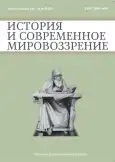Мировоззрение, мышление и история
- Авторы: Герасимов Г.И.1
-
Учреждения:
- Тульский государственный музей оружия
- Выпуск: Том 5, № 2 (2023)
- Страницы: 13-22
- Раздел: ДИСКУССИОННЫЕ ПРОБЛЕМЫ ИСТОРИИ
- URL: https://journals.eco-vector.com/2658-4654/article/view/568427
- DOI: https://doi.org/10.33693/2658-4654-2023-5-2-13-22
- EDN: https://elibrary.ru/BFJOXW
- ID: 568427
Цитировать
Полный текст
Аннотация
Цель данной статьи — выяснить влияние мировоззрения на мышление и историописание. Теоретико-методологической основой исследования является авторский идеалистический подход. В статье показано влияние мировоззрения на процесс мышления и создания образа прошлого. Определена роль идей в процессе восприятия внешнего мира, формирования опыта и воображения. Обоснована зависимость способа мышления от господствующего в сознании историка мировоззрения. Раскрыта возможность и условия понимания мышления и логики людей определенной исторической эпохи. Дана характеристика способов мышления в разные мировоззренческие эпохи. Выясняется влияние мировоззрения на исторические действия людей, а также обосновывается понятие субъективно-объективной реальности. В заключении автор делает выводы о том, что способ мышления и его логика определяются господствующим мировоззрением. Мировоззрение и соответствующий ему способ мышления определяют историческую деятельность человека, поэтому главная задача историка при создании образа прошлого состоит в том, чтобы понять, какие идеи лежали в основе исторического действия.
Полный текст
Об авторах
Григорий Иванович Герасимов
Тульский государственный музей оружия
Автор, ответственный за переписку.
Email: ggi1957@mail.ru
ORCID iD: 0000-0003-4479-2620
ResearcherId: R-7767-2016
доктор исторических наук, доцент, научный консультант
Россия, ТулаСписок литературы
- Вертгеймер М. Продуктивное мышление. М., 1987. 335 с.
- Герасимов Г. Идеалистический подход к истории: теория, методология, концепции. Екатеринбург: Издательские решения, 2022. 342 с.
- Давыденков О., прот. Догматическое богословие. М., 2013. 622 с.
- Личман, Б. В. История России с древнейших времен до конца XIX века. М.: Издательство Юрайт, 2019. 245 с.
- Личман Б.В. Тезисы для обсуждения концепции «цель, смысл в истории — цель, смысл в мировоззрении — цель, смысл в национальной идее» //История и современное мировоззрение. 2019. Т.1. №3. С. 9–13.
- Кассирер Э. Избранное. Индивид и космос. М.-СПб., 2000. 654 с.
- Кассирер Э. Избранное. Опыт о человеке. М., 1998. 784 с.
- Леви-Брюль Л. Сверхъестественное в первобытном мышлении. М., 1937. 533 с.
- Лосев А.Ф. Диалектика мифа. М., 2001. 558 с.
- Лосский В. Н. Предание и предания //Лосский В. Н. Богословие и боговидение. М., 2000. 628 c.
- Майданов А.С. Малый органон мифологического творчества // NB: Философские исследования. 2014. № 2. С. 71–162. http://e-notabene.ru/fr/article_11070.html
- Меркулов И.П. Мышление /Философия: Энциклопедический словарь. М., 2004. С. 565–569.
- Найссер У. Познание и реальность. М., 1981. 232с.
- Переслегин С. Как следует мыслить христианину? Христианское мышление в контексте других форматов мышления: ретроспектива и перспектива. 2011. http://www.archipelag.ru/agenda/gospel_povestka/konferens_r_vs_r_2011/r_vs_r_2011_text6/
- Розин В.М. Мышление и творчество. М., 2006. 360с.
- Рузавин Г.И. Методология научного познания. М., 2012. 287 с.
- Степин B.C. История и философия науки. М., 2011. 423 с.
- Степин В.С., Горохов В.Г., Розов М.А. Философия науки и техники. М., 1999. М., 1999. 400 с.
- Тэйлор Э. Первобытная культура. М., 1939. 567с.
- Фейерабенд П. Избранные труды по методологии науки. М., 1986. 542 с.
- Штейнер Р. Истина и наука. М., 1992. 56 с.
Дополнительные файлы








